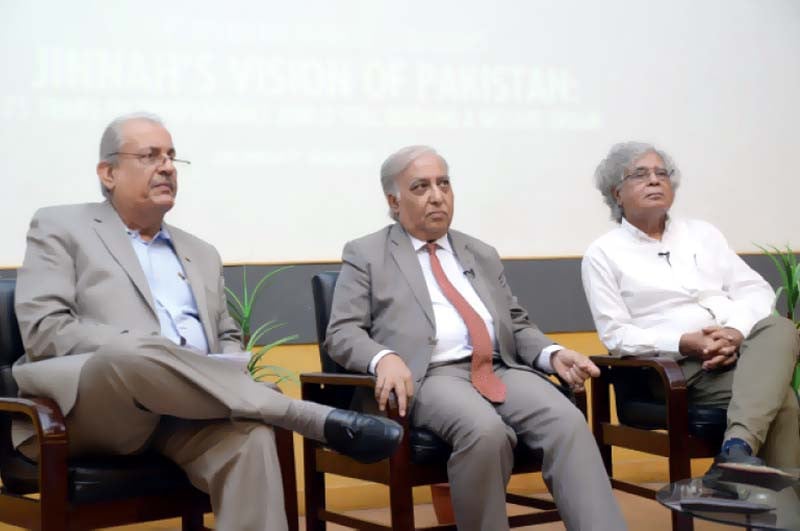
Ziauddin University presented the 14th interactive series of ZU Dialogues, titled "Jinnah's Vision of Pakistan: 75 years of independence and it still remains a distant dream" to explore the state of Pakistan today and demonstrate how completely different Jinnah's vision is from it.
By outlining a few resolutions and establishing distinctions between Pakistan's past and present, former Senate chairman Raza Rabbani explained Jinnah's vision in the most straightforward terms possible.
He said that 75 years down the line we have a state which was converted from welfare to a national security state and therefore the priorities in 1947 changed over the decades.
"From a federation Pakistan became a centralized state and we were converted into a state where there was one unit we were converted into a state which at that time talked about parity and we became a central state from a federal state from a parliamentary democracy."
There have been times when the constitution was suspended, "we have had military dictatorships, and there have been times when the presidential system of government has been in effect."
These are the many stages to democratic dominance. According to me, this is the goal of Jinnah, and this is where we are sadly right now. From a state that has cultural variety because it is naturally, ethnically and culturally varied. "We have a governing class that turned Pakistan or attempts to convert Pakistan into a homogenous state", he continued.
Taking the historical point of view in mind Prof. Dr. Syed Jaffer Ahmed, Director, Institute of Historical and Social Research explained, "without understanding the historical context and social milieu of Jinnah, it is impossible to comprehend his vision. Even surpassing one of the greatest leaders, Mustafa Kamel Ataturk, I think Jinnah was the greatest Muslim leader of the 20th century."
Jinnah was also a modernist who was influenced by western ideas of democracy, he said. While serving in the Indian Legislative Assembly, he repeatedly urged the British rulers to grant Indian parliament the same level of autonomy as their own parliamentary system. In a brief speech on August 11, he referred to the Pakistani parliament as the supreme parliament of Pakistan, using the phrase three times, he added.
Senior journalist, writer and social activist Ghazi Salahuddin continued the discussion while saying, "there are some issues that have not been resolved. As an illustration, he stated in his speech that "you are free to go to your temples, you are free to go to your mosques or to any other places of worship in this State of Pakistan", but what he really meant to say was that the government should not be involved in matters of religion.
"We claim that Jinnah gave us a secular state, but it also interferes with Pakistan's movement. Few students attend general history lessons in schools and universities, and those who do tend to overlook Pakistani history and poorly transmit it. Instead, you should revisit history, comprehend it, and form your own opinion of Pakistan, he further stated.
Earlier, in welcome speech Ziauddin University Pro-chancellor Dr Nida Hussain said that Pakistan is going through its worst political and constitutional and economic crisis. Conversations about botomless fall of rupee, soaring inflation, political instability and such have beocme part of daily life. The knowledgeable panelists will provide us with some insightful knowledge, facts, and opinions on this subject."
In his concluding remarks, Ziauddin University Vice Chancellor Prof Dr Syed Irfan Hyder said the fact that none of the countries that are similar to Pakistan are democratic and independent is proof that we neglected the point in the room during this conversation. Although we live in a post-colonial world, we are still subject to the dictates of the point in the room." He also thanked everyone for their time, passion, effort and energy to debate on this topic.
Published in The Express Tribune, August 2nd, 2022.




1731916090-0/sabrina-(3)1731916090-0-165x106.webp)













COMMENTS
Comments are moderated and generally will be posted if they are on-topic and not abusive.
For more information, please see our Comments FAQ